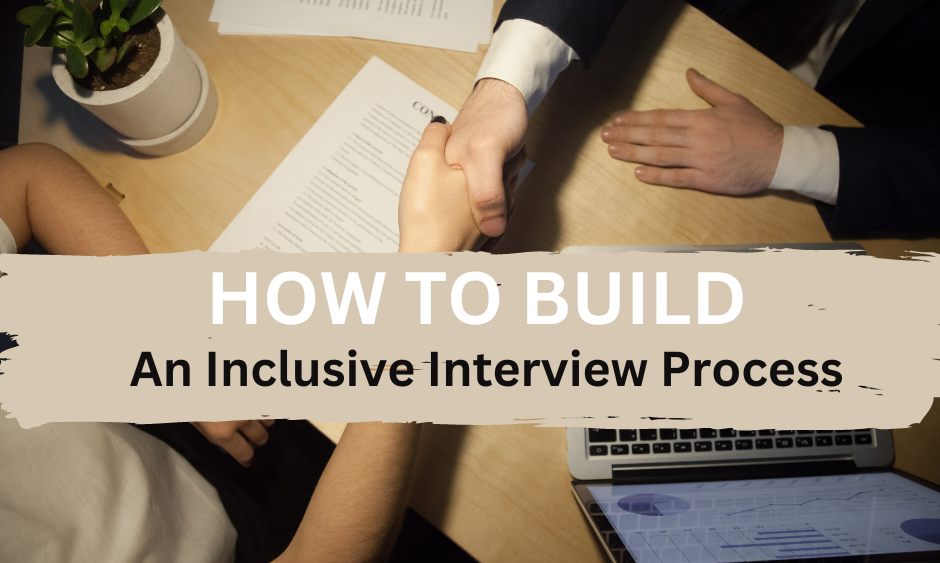Landing the perfect candidate is crucial to any business, given the fact that a great hire can contribute significantly to the revenue boost of your organisation. But finding the right candidate is just the first part of the process: the next stage is an inclusive interview.
According to a survey conducted by Glassdoor, 67% of job seekers consider a diverse workforce important when considering job offers. This suggests that a significant proportion of employees prefer working for organisations that prioritise diversity. Additionally, a study by McKinsey & Company found that companies that honor diversity are 35% more likely to outshine their peers. This indicates that diversity-focused organisations tend to perform better and are more attractive to employees.
Inclusive Interview Practices:
To access a diverse pool of candidates, an inclusive interview process must also be in place. To ensure that, organisations need to have the following practices set up:
- Including diverse interview panels helps mitigate unconscious bias and ensure a more comprehensive evaluation of candidates, promoting fairness and objectivity in the interview process
- Structured interviews, where all candidates respond to the same set of questions, reduce bias and promote fairness by objectively evaluating candidates based on predetermined indicators of success
- Educating interviewers on recognising and minimising unconscious biases is crucial for creating an inclusive interview experience
- Prioritising qualifications and skills over personal attributes during interviews leads to more objective hiring decisions and ensures candidates are assessed based on their job abilities.
- Forming diverse interview panels, exploring new recruitment channels for underrepresented groups, and creating an environment where candidates feel valued contribute to a more inclusive interview process
- Accommodating candidates with disabilities ensures equal participation in the interview process and removes unnecessary barriers.
- Using inclusive language in job descriptions, removing biases, and emphasising the organisation’s commitment to diversity and inclusion sets the tone for an inclusive hiring process from the start.
By incorporating these practices and strategies, organisations can create a more welcoming, fair, and inclusive interview process that attracts diverse talent, fosters innovation, and promotes equality in hiring decisions.
In today’s competitive talent market, building a diverse and inclusive team isn’t just a social good, it’s a strategic advantage. But how do you ensure your interview process isn’t inadvertently filtering out qualified candidates from different backgrounds? Here are actionable steps to create a welcoming and fair hiring experience:
Before the Interview:
- Inclusive Job Descriptions: Write job descriptions focusing on skills and qualifications, avoiding biased language based on gender, age, or ethnicity.
- Accessibility: Ensure your career website and application process are accessible to candidates with disabilities. Offer alternative application methods if needed.
- Diverse Interview Panels: Assemble interview teams that reflect the diversity you hope to cultivate within your company. This reduces unconscious bias and allows candidates to see themselves represented.
Creating a Welcoming Environment:
- Clear Communication: Provide clear instructions about the interview format and what to expect. Offer interview scheduling options to accommodate diverse needs.
- Accessibility Accommodations: Proactively ask candidates if they require any accessibility accommodations during the interview process.
- Respectful Greetings: Use a candidate’s preferred pronouns and greet them warmly. Create a comfortable interview space that is free from distractions.
Structuring the Interview:
- Standardised Questions: Use a standardised set of interview questions for all candidates applying for the same position.
- Focus on Skills: Design questions that assess the specific skills and competencies required for the job, not irrelevant personal experiences.
- Behavioral Interviewing: Utilise behavioral interviewing techniques, asking candidates for specific examples of how they have demonstrated the required skills in previous situations.
- Alternative Assessment Options: Consider using work sample tests or practical exercises alongside traditional interview methods.
Beyond the Interview:
- Debrief with Interview Panel: After each interview, have the panel debrief to discuss the candidate’s qualifications based on the pre-determined criteria. This reduces individual biases.
- Provide Feedback (Optional): Consider offering all candidates brief feedback on their interview performance, even those not selected.
- Continuous Improvement: Regularly assess your interview process for areas of bias and make adjustments as needed.
By following these steps, you can create an interview process that attracts top talent from a wider pool of qualified candidates. At the India Diversity Forum, you can learn more about the prerequisites required to seamlessly integrate an inclusive interview process. Remember, inclusivity isn’t just about fairness, it’s about building a high-performing team that brings a diversity of perspectives to the table. This will ultimately lead to a stronger and more successful organisation.


